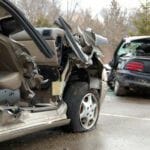What to Do if Your Motorcycle Is Hit by a Car from Behind

March 23, 2022 / Vehicle Accidents
The average motorcycle weighs just 700 pounds, and when one collides with a much heavier truck or car, the consequences can be severe. Motorcycle accidents are often deadly. You may be asking what to do if your motorcycle is hit by a car from behind. Are there certain steps you should take to ensure your immediate safety? Let’s take a closer look at motorcycle crashes.
There were 8,596,314 motorcycles registered in the U.S. in 2019, and they traveled more than 19 billion vehicle miles that year. There were 5,014 fatalities due to motorcycle crashes in 2019, and an additional 84,000 motorcyclists were injured. Fatality rates were roughly 58 per 100 million vehicle miles traveled among motorcyclists, compared to a much lower 9 per 100 million vehicle miles traveled among passenger vehicle occupants. Clearly, statistics show that riding on a motorcycle is risky.
The most dangerous times to ride a motorcycle (where accidents are concerned) is between 3 p.m. and 6 p.m. on weekdays and between 6 p.m. and 9 p.m. on weekends. Although motorcycles make up only 3% of all registered vehicles and 0.6% of all vehicle miles traveled in the U.S., motorcyclists accounted for 14% of all traffic fatalities, 17% of all occupant fatalities, and 3% of all occupant injuries in 2019, according to the National Safety Council.
Important Steps to Take
If your motorcycle is hit by a car from behind, there are several important steps you should take.
- Call 911 and ask for police to respond to the scene.
- Seek medical attention right away.
- Get the name, driver’s license, and insurance information from the other driver.
- If you are able, use your smartphone to take pictures of your injuries, damage to both vehicles, and the accident scene.
- Get the names and contact information of any eyewitnesses and bystanders who may have seen or heard the crash.
- Gather any physical evidence of the crash that may be scattered at the scene if you can.
- Hire a motorcycle accident lawyer.
By taking these steps, you will ensure that your injuries are treated with the appropriate medical attention and your legal rights are preserved. You also want to make sure you file a legal claim before the statute of limitations runs out.
Caution: Things Not to Do If Your Motorcycle Is Hit by a Car from Behind
Just like there are things to do if your motorcycle is hit by a car from behind, there are also things you absolutely should not do. These include:
1. STAY AWAY FROM SOCIAL MEDIA
You want to avoid posting pictures or comments on social media about your motorcycle accident. Insurance companies may scan your Facebook, Instagram, or Twitter account to see what you’re saying and doing in the days and weeks immediately after your crash. If you post comments about the wreck that contradict the version you told police, you could significantly reduce the likelihood of collecting compensation. Also, if your lawsuit states that you’re severely injured and then there are videos on Facebook of you zip lining or playing flag football the week after the crash, these can destroy your claim. So, be safe rather than sorry — stay off social media.
2. DON’T OVER-EXPLAIN TO POLICE OR SAY THE ACCIDENT WAS YOUR FAULT
Sometimes in the moments after being involved in a traffic accident, a victim feels the need to explain in great detail exactly what happened. Victims, who are often in shock or crying, may also be tempted to say the accident was their own fault. You want to avoid both of these things. After police respond to the accident site, answer their questions honestly and succinctly. Do not over-explain or try to provide details they do not ask for.
3. DON’T SETTLE FOR A LOW-BALL OFFER WITHOUT A LAWYER REPRESENTING YOU
Sometimes insurance companies will contact you directly – even arrive in-person at your home – and offer you a check for a small amount of money if you agree to settle your claim immediately. This is a common tactic. The dollar amount could be significantly less than you would receive if you hired a lawyer to negotiate aggressively on your behalf. Always speak to a lawyer to find out what your claim is worth before accepting a check from an insurance company.
Compensation You May Be Entitled To
The compensation you receive after a motorcycle accident depends on several factors, including the severity of your injuries, amount of time off work, and number of defendants. Typically, an injured person is entitled to both economic damages (financial costs) and non-economic damages (emotional costs and other losses). Examples of these include:
Economic Damages
- Medical and rehabilitation expenses
- Future medical care
- Lost wages
- Loss of future earnings potential
- Property damage
Non-Economic Damages
- Pain and suffering
- Scarring and disfigurement
- Loss of consortium
- Mental anguish and emotional distress
Punitive Damages – In some cases, a judge can award additional “punitive damages” if a defendant(s) was particularly egregious in their absolute disregard for other people’s safety. These damages are awarded to punish the guilty party and send a warning to other would-be wrongdoers.
Contact Stephenson Rife Today
If you are injured after your motorcycle is hit by a car from behind, you may be entitled to financial compensation. This is especially true if the accident was due to someone else’s negligence. The driver of the car that hit you may have been drunk, texting, reckless, or otherwise distracted. His or her disregard for the safety of other motorists on the road is dangerous. Motorcyclists often bear the brunt of a crash even if they were not at fault.
The average car weighs about 4,000 pounds – nearly 6 times the weight of a motorcycle. Imagine the impact when a car rams into the back of a motorcycle! You may have sustained broken bones, head trauma, internal bleeding, burns, or worse. You don’t have to suffer alone. The Indianapolis motorcycle accident lawyer at Stephenson Rife will fight aggressively for the justice you deserve. To find out more about how we can help, call us for a free consultation at (317) 680-2501.

 Mike Stephenson has 40 years of experience and is a trusted advisor to many individuals and companies. His current practice is dominated by civil litigation in state and federal courts. He focuses much of his time on handling catastrophic injuries caused by all types of accidents, including motor vehicle, trucking, workplace injuries, product liability, and fire, just to name a few. He also works extensively in construction accidents. [
Mike Stephenson has 40 years of experience and is a trusted advisor to many individuals and companies. His current practice is dominated by civil litigation in state and federal courts. He focuses much of his time on handling catastrophic injuries caused by all types of accidents, including motor vehicle, trucking, workplace injuries, product liability, and fire, just to name a few. He also works extensively in construction accidents. [ 